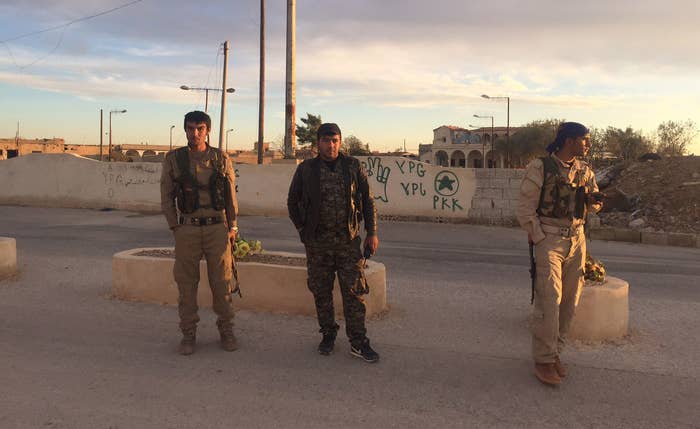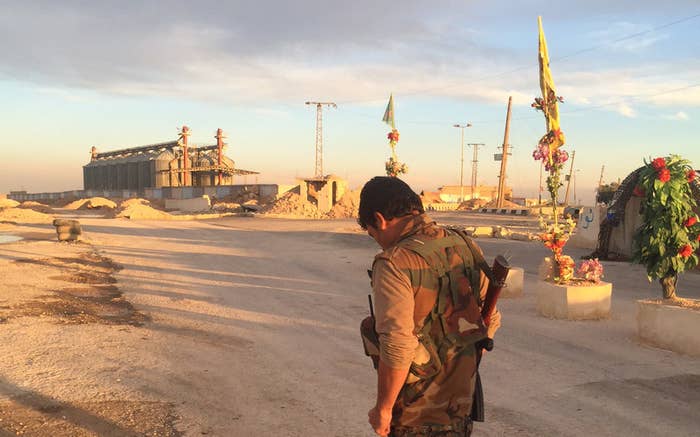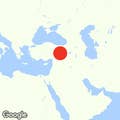
AYN ISSA, Syria — The 20-year-old soldier at a military post on the road to Raqqa felt he had the world's gaze at his back.
He stood near a camouflaged pickup truck in the closest town U.S.-backed fighters control outside ISIS’s de facto capital Raqqa, some 30 miles down the road. In the wake of the Paris attacks, new attention has been focused on the idea of an assault on Raqqa, the nexus of ISIS's terror network and its symbolic heart. Some of the local fighters who would carry out such a push on the ground said that after Paris, their war had a fresh sense of urgency. "Everyone is now trying to understand how it's possible to push ISIS back," said the soldier, Rubar Afrin.
The fighters holding down the town of Ayn Issa, which sits on the highway to Raqqa, are also manning the front lines of the escalating international war against the jihadis. In the days since the terror attacks in Paris, French and U.S. airstrikes have pounded the city — the place where the militants first began to carve out their self-styled caliphate — with barrages of airstrikes. Fighters in the town noted the intensity of the strikes, along with a spike in civilians fleeing.
"I don't think they'll be able to resist in Raqqa after all this pressure," said Nadin Ali, 30, standing guard at Ayn Issa's entrance.
Ethnic Kurdish forces supported by Arab militias took Ayn Issa from ISIS in July shortly after their strategic coup in winning the town of Tel Abyad, a key crossing on the border with Turkey. It has largely remained static since; between the town and the ISIS-held villages just outside Raqqa lies a long swathe of highway and desert. The town was eerily quiet as the sun set on Thursday, interrupted by the blast from a mortar falling nearby that had been fired by the jihadis dug into a village just beyond some hills. Soldiers tried to scare away a feral dog digging up bodies of ISIS fighters from a nearby grave.
Some of the soldiers there had been too busy with their war — they said ISIS still sent harassing forces to the town regularly — to give much thought to events in Paris. Two were unaware that the massacre had even taken place. But others were tuned into the news and expecting their push toward Raqqa to pick up steam. "For sure after the Paris attacks things will change," said a 22-year-old fighter who gave only his first name, Rami.
That current campaign around Raqqa has also become a subject of intrigue in Western capitals, just as French President François Hollande announced “France is at war,” outlining new efforts to fight ISIS. In Washington, the airstrikes have renewed the debate over how effective these kinds of strikes can be in containing or obliterating ISIS, and whether a campaign like this can accomplish the mission entirely.
There are various local forces fighting ISIS across its many fronts in Syria and Iraq, but outside Raqqa, the groundwork is being laid to strengthen the kind of coalition on hand in Ayn Issa. It is led by an ethnic Kurdish militia called the People's Protection Units — known by its Kurdish acronym, YPG. The YPG is closely linked to the PKK, the Turkish insurgent group declared a terrorist group by Washington and Ankara, but has been coordinating closely with U.S. airstrikes in its fight against ISIS in Syria for more than a year.

In October, the U.S. airdropped a 45-ton cache of weapons to a new coalition called the Syrian Democratic Forces, announced the same day, which it said would be spearheaded by the YPG but would also include Arab groups that draw members from areas under ISIS’s control. The coalition would be central to U.S. plans to push closer to Raqqa and sever key supply lines into the city.
Shortly after the airdrop, the Obama administration announced that 50 U.S. special forces operators would be deployed to Syria's Kurdish region in the north to help direct the anti-ISIS fight.
"The recent attacks in Paris will likely put a spotlight on the YPG and Syria Democratic Forces and what they can actually do in putting pressure on ISIS. Some are even hailing them as a force that can take Raqqa at some point," said the Washington Institute's Andrew Tabler, an expert on Syria's war. "That's a long way off though."
The YPG has been wary of pushing into Arab territory like Raqqa; the Arab militias that will be counted on to fill in the gaps remain weak. Experts say that instead of a quick March on Raqqa the military efforts against ISIS on the ground in Syria will focus on the kind of incremental progress the YPG and its allies have been making in places like al-Hasakah, in southern countryside of Syria. And the Obama administration has shown no sign that it will deviate from its hesitant and piecemeal approach to the war against the militants. U.S. officials and analysts said a major offensive in Raqqa remained in the distance.
The soldiers in Ayn Issa vowed to press on with their fight regardless of international plans. "As long as there is ISIS, we can't sleep comfortably," said a 26-year-old Kurdish fighter there.
The troops in Ayn Issa said ISIS militants still attacked them with small teams of fighters and suicide bombers there, making them more anxious as night fell. The long drive back to a YPG base closer to the Turkish border underlined their precarious hold on the war-battered villages between. Checkpoints were makeshift and sparsely manned; one, run by an Arab militia, was overseen by a skinny boy of 13 who sat in an easy chair along the roadside holding a Kalashnikov. "If we don't go to Raqqa," said a young YPG fighter, as his car rolled along the bumpy route, "who will?"

